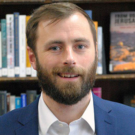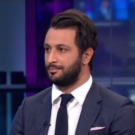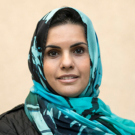Speakers

Tim Eaton
Senior Research Fellow, Middle East and North Africa Programme
Chatham House

Anas El Gomati
Founder and Director
Sadeq Institute, Libya

Zahra’ Langhi
Co-founder and CEO
Libyan Women's Platform for Peace

Hanan Salah
Libya Director
Human Rights Watch
Moderator
About the Webinar:
On December 16, 2021, Arab Center Washington DC (ACW) held a webinar titled “Libya’s Upcoming Elections and Prospects for Democratic Transition.” Speakers were Anas El Gomati, the Founder and Director of the Sadeq Institute (Libya); Hanan Saleh, Libya Director at Human Rights Watch; Zahra’ Langhi, Co-Founder and CEO of the Libyan Women’s Platform for Peace; and Tim Eaton, Senior Research Fellow in the Middle East and North Africa Programme at Chatham House. ACW Executive Director Khalil E. Jahshan moderated the event.
Anas El Gomati first addressed why “Libyans are essentially in the dark” regarding the elections, noting that the reason to hold the elections now, at such an unstable and volatile time in the country, is unclear. He said that Libyans want elections to fulfill their democratic right and enable the transition of Libya from the not war, not peace scenario they have endured; they especially want to have a democratic and accountable government. El Gomati noted that the presidency in Libya is a powerful position, as the president is considered the supreme commander of the armed forces. He discussed the need to reform the electoral law, which he said was designed to perpetuate power of certain individuals. He also prioritized the importance of security in the country and stated that the October 2020 cease-fire agreement is inadequate, especially because ofthe presence of mercenaries supported by outside actors and numerous cease-fire violations. He emphasized the dichotomy that is presented— that “if we have elections there will be violence, and if we don’t, there will be violence”—is problematic; instead, he clarified, it is more helpful to ask about the steps that could be implemented to alleviate these conditions. “Libya is literally and figuratively covered in crime scene tape,”he added, so to hold elections now would be to reward powerful actors with political expediency.
Hanan Salah offered her view that national elections are badly needed as a key to building a democratic Libya with principles grounded in the rule of law, justice, and accountability; however, she agreed with El Gomati’s view, saying that “no free and fair elections are possible at this time in Libya.” She stated that human rights conditions in Libya are precarious and mentioned examples of those in detention; civilian casualties and unlawful killings; hundreds who remain missing, including civilians; impunity among powerful actors in the country; and the proliferation of armed groups and militias. Salah argued thatto hold elections, the environment in Libya should be free to facilitate them: elections should be inclusive of many different sectors of society; freedom of speech and association should be granted, including for the media; there should be no risk of intimidation and attacks; civic groups must operate freely; candidates need to be able to move around the country; parts of Libya continue to evince serious hostility and violence, and this should be dealt with effectively; and the judiciary should be independent and able to enforce accountability. Salahrecommended that before rushing to hold elections at any cost, the UN mission and some Security Council members should urge Libyan authorities to create conditions that are conduciveto a free and fair vote, thus making sure that the environment is free of coercion, discrimination, and intimidation of voters and candidates. In addition, she said, the government must ensure that there is a robust security plan for polling places.
Zahra’ Langhi spoke based on her experience as a member of Libyan Political Dialogue Forum, having participated in peace negotiations since 2013. In her opinion, elections are overdueand should take place as currently planned. She spoke briefly about the history of Libyan politics as informing the current situation and pointed to the political forces of the status quo thatwant to stay in power at all costs. Langhi explained that they do not want Libyans to directly vote for the president, but rather have a parliamentary system that chooses the office holder.“What we see in Libya today is tyranny of the minority, the state capture by the oligarchs,” she argued. In her view, the problem is the polarization of the elections—whether to have them or not. Rather, she said, the discussion should be that elections must be held and the country should work to mitigate the challenges around holding them. Langhi added that the country cannot lose this momentum right now; otherwise, the Libyan people would lose trust in any process led by the international community. Further, she emphasized the importance of pushing for a comprehensive approach that links the three tracks of the larger dynamics in Libya, the political, economic, and military.
Tim Eaton prefaced his remarks by saying that conditions in Libya are not in place for free and fair elections. He offered three possible options for Libya to pursue regarding the upcoming elections, the first being to institute a short delay; however, he noted that this scenario would not move things forward and would not guarantee that whoever wins would be able to wield power in all parts of the country. In addition, at this time, there is no structure to guarantee that a new government could be held accountable. The second option, according to Eaton, is a longer-term delay to offer more time to address legal issues and promote consensus around many of the thorny issues in the elections process. The third scenario would be to acceptthat the interim government has become part of the problem; Eaton explained it has not fulfilled the power-sharing formula and it is using state funds to help stop the outcome of the elections. He agreed with other speakers that the most importantquestion is not that elections take place, but that the Libyanpeople have a say in how they are governed. Further, Eaton emphasized that it is vital for there to be a structure in place for what happens after elections are concluded, such as a charter to address social reforms and political accountability in Libya.

